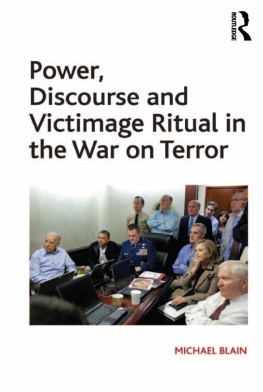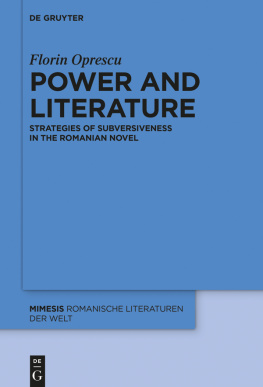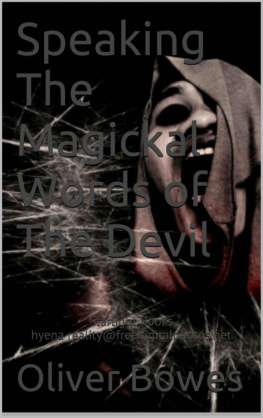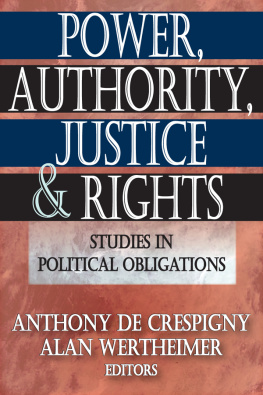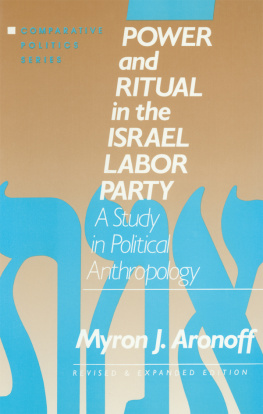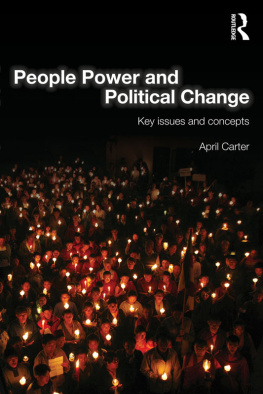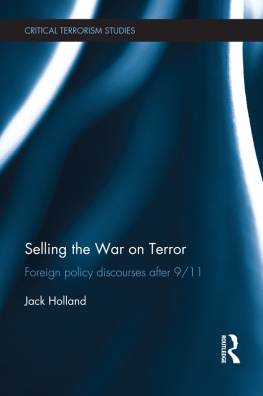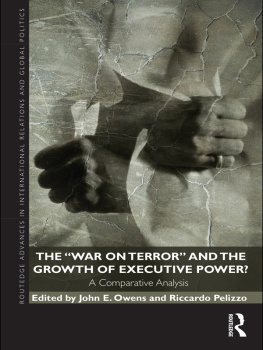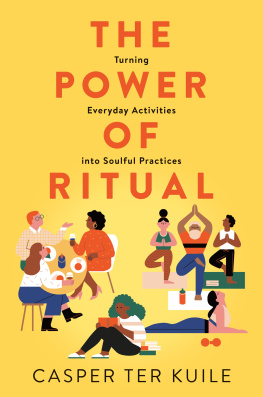POWER, DISCOURSE AND VICTIMAGE RITUAL IN THE WAR ON TERROR
To Angie
Power, Discourse and Victimage Ritual in the War on Terror
MICHAEL BLAIN
Boise State University, USA
First published 2012 by Ashgate Publishing
Published 2016 by Routledge
2 Park Square, Milton Park, Abingdon, Oxon OX14 4RN
711 Third Avenue, New York, NY 10017, USA
Routledge is an imprint of the Taylor & Francis Group, an informa business
Copyright 2012 Michael Blain
Michael Blain has asserted his right under the Copyright, Designs and Patents Act, 1988, to be identified as the author of this work.
All rights reserved. No part of this book may be reprinted or reproduced or utilised in any form or by any electronic, mechanical, or other means, now known or hereafter invented, including photocopying and recording, or in any information storage or retrieval system, without permission in writing from the publishers.
Notice:
Product or corporate names may be trademarks or registered trademarks, and are used only for identification and explanation without intent to infringe.
British Library Cataloguing in Publication Data
Blain, Michael, 1943
Power, discourse and victimage ritual in the war on terror.
1. Power (Social sciences) 2. Abuse of administrative power. 3. Social control. 4. Terrorism Prevention Political aspects. 5. Terrorism Prevention Social aspects.
I. Title
303.3dc23
Library of Congress Cataloging-in-Publication Data
Blain, Michael, 1943
Power, discourse, and victimage ritual in the war on terror / by Michael Blain.
p. cm.
Includes bibliographical references and index.
ISBN 9781409436058 (marketing : alk. paper) 1. Terrorism Social aspects. 2. Political violence Social aspects. 3. Power (Social sciences) I. Title.
HV6431.B569 2012
303.625dc23
2012005212
ISBN 9781409436058 (hbk)
ISBN 9781315601847 (ebk)
Contents
List of Diagrams and Charts
Diagrams
Charts
List of Tables
Acknowledgements
I am deeply indebted to my wife, Angeline Kearns Blain, for the continuing emotional support and encouragement needed to finish this project. I have benefited greatly from her distinctively Irish perspective on political violence, terrorism, and issues of colonial domination. Her research on the role of women in the peace movement has permanently altered my perspective on violence.
I would like to express special gratitude to my colleague, Edward McLuskie. His graduate seminar on Communication, Power, and Critical Theory was a crucial testing ground for many of the sharper theoretical and empirical points advanced in this work.
I would also like to acknowledge the continuing support of my colleagues in the Department of Sociology, Boise State University. I am particularly indebted to the Chairs of the Sociology Department while I worked on this project, Professors Martin Orr and Steven Patrick. In the face of tight budgets and severe time constraints, they provided much needed financial support and release time to facilitate the production of this book.
I am grateful to the following research assistants who have helped me collect and analyze the data reported in this book: Macy Boggs, Amity Harrison, Jennifer Simpson, Nikki Weihe, Eiko Strader, and Loraine Hand.
Many thanks to professional colleagues who read or discussed earlier publications or paper presentations relevant to the theme of this book: Mabel Berezin, Laura Edles, Jorge Capetillo-Ponce, Sam Binkley, Elaine Campbell, Don Winieki, William Bogard, Deborah Staines, Joan Kirkby, A. Dirk Moses, G. William Domhoff, John Walton, Paul Rabinow, and Hubert Dreyfus.
I would like to acknowledge the highly competent and compassionate editorial support of Neil Jordan (Commissioning Editor) and Mrs Celia Barlow (Senior Editor) at Ashgate Publishing Group. Thanks to the anonymous reviewers of the original proposal who were encouraging and thought-provoking in their recommendations. Tom Norton did a superlative job indexing the text. I am very gratified and grateful to Professor Vian Bekel for her kind and courageous endorsement of my controversial thesis concerning American political violence.
And, finally, thanks to our close personal friends who have supported Angeline and I in many ways: Ariel McLuskie, Lynn Lubamersky, Nick Miller, and Chad and Vashti Summerville.
Chapter 1
Cycles of Violence
They knew it, the fervent pupils of Pythagoras:
that stars and humans revolve in a cycle
The Cyclical Night by Jorge Luis Borges (1967)
This book elaborates a new interpretation of the U.S. led global war on terrorism. The analysis merges concepts derived from Kenneth Burkes dramatism and theory of victimage rituals, with Michel Foucaults account of power relations and biopolitics in modern liberal societies. Blending these ideas with current thinking in the sociology of politics and violence, it fashions a critical perspective on the causes and effects of the war on terrorism. The global campaign against terrorism, it proposes, is a liberal mode of power and subjection by means of victimage ritual.
The war against terrorism provides the U.S. power elite with a new pretext for extending its hegemony over new territories and populations, and legitimating an intensification of homeland security, domestic surveillance and social control (for discussion of power elite theory, see Domhoff 1990, 2006, 2010). The global war against terrorists is a victimage ritual employed by the power elite to mobilize masses as a calculated means to exercise power to achieve their objectives. This use of victimage ritual involves a perverse use of a religious system of thought to accomplish political purposes. The war on terror is just the most recent case. The juridical significance of this political theology as a justification for declarations of states of emergency and dictatorship (e.g., the 1933 Reichstag terror attack), was explicitly recognized in a 1922 essay by Karl Schmitt (Political Theology, 1985: 3652), the Nazi legal theorist:
All significant concepts of the modern theory of the state are secularized theological concepts not only because of their historical developmentin which they were transferred from theology to the theory of the state, whereby, for example, the omnipotent God became the omnipotent lawgiverbut also because of their systematic structure, the recognition of which is necessary for a sociological consideration of these concepts. The exception in jurisprudence is analogous to the miracle in theology (1985: 37).
Schmitts statement is a strong gloss on his definition of Sovereignty: Sovereign is he who decides on the exception (1985: 5). By this Schmitt means an exception to the rule of law. More recent examples of this kind of miracle include President Bushs November 13, 2001 military order authorizing the indefinite detention and trial by military commissions of noncitizens suspected of involvement in
If, as Schmitt argued, the friend/enemy criterion delineates the concept of the political and the political is theological in form, then the struggle against the enemy is a Manichean struggle of good against evil. Any actor who threatens the survival of the stateforeign or domestic enemiesis the incarnation of evil or the devil. The war on terror, in this sense, enacts a theological system of thought. The Islamic terrorist has been perfected in the role of international devil and liberal scapegoat. Osama bin Laden personifies the evil one who must be sacrificed.

